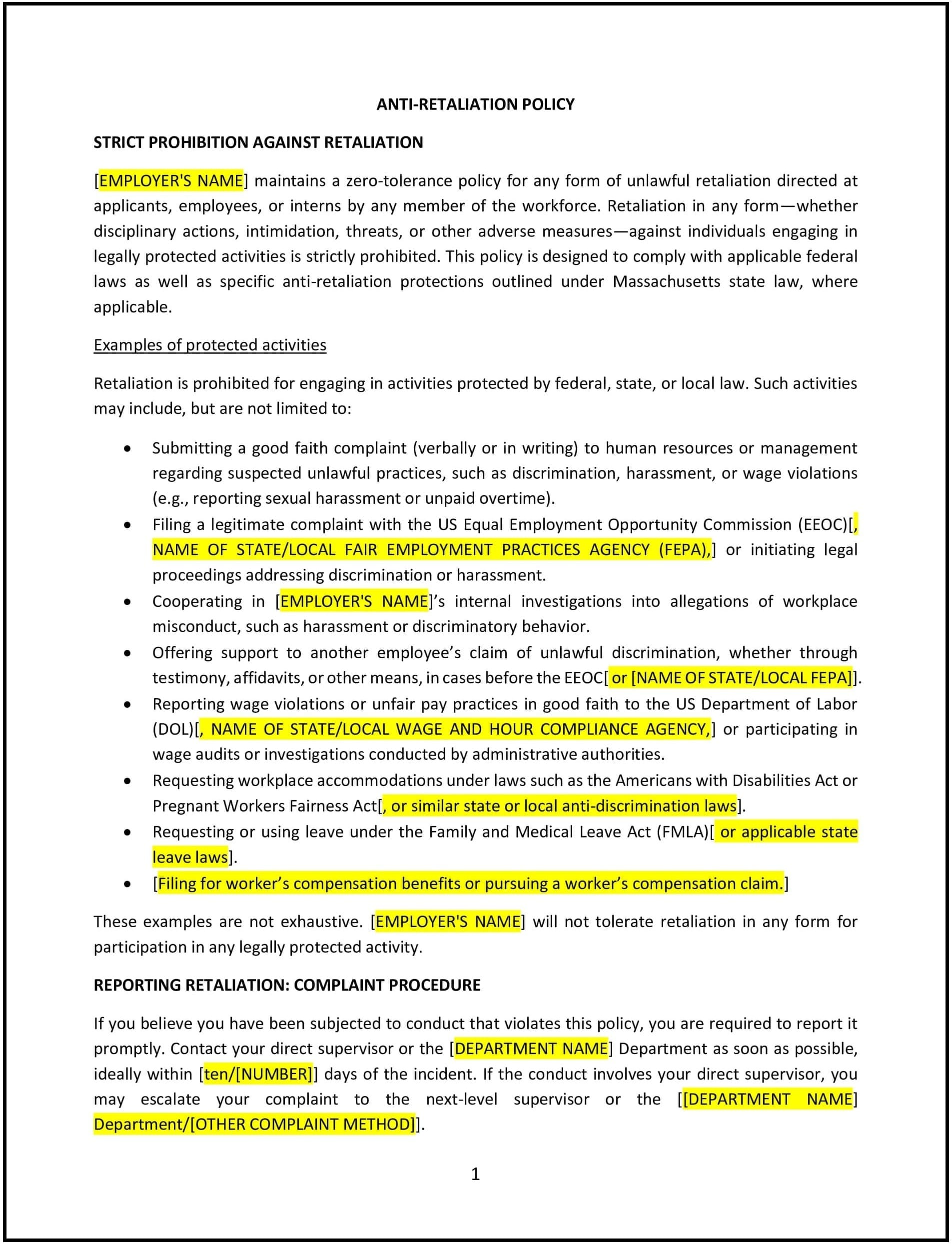Anti-retaliation policy (Massachusetts): Free template
Got contracts to review? While you're here for policies, let Cobrief make contract review effortless—start your free review now.

Customize this template for free
This anti-retaliation policy is designed to help Massachusetts businesses create a work environment where employees can report issues or concerns—such as discrimination, harassment, or violations of company policy—without fear of retaliation. The policy ensures that employees who raise concerns or participate in investigations are protected from adverse actions such as termination, demotion, or harassment.
By adopting this policy, businesses can foster an environment of trust and open communication, encourage employees to speak up about potential issues, and strengthen compliance with Massachusetts state laws and federal regulations prohibiting retaliation.
How to use this anti-retaliation policy (Massachusetts)
- Define retaliation: Clearly define what constitutes retaliation, including adverse actions taken against an employee for reporting concerns, participating in investigations, or exercising legal rights. Examples of retaliation include firing, demotion, disciplinary actions, negative performance evaluations, or other actions that negatively impact the employee’s employment.
- Establish reporting channels: Provide clear and accessible reporting channels for employees who believe they are experiencing retaliation. These should include HR, a compliance officer, or a confidential reporting system. Employees should be encouraged to report retaliation concerns promptly.
- Clarify protection from retaliation: Specify that employees are protected from retaliation when they raise concerns in good faith, report violations, or participate in investigations, even if their allegations are not substantiated.
- Set investigation procedures: Outline how retaliation claims will be investigated. This should include a clear process for handling complaints, ensuring impartiality and confidentiality during the investigation, and taking corrective action when necessary.
- Address confidentiality: Emphasize the importance of confidentiality during retaliation investigations to protect both the complainant and any witnesses from unnecessary exposure. Information related to the investigation should only be disclosed on a need-to-know basis.
- Provide disciplinary consequences: Clearly state that retaliation will result in disciplinary action, which may include warnings, suspension, or termination, depending on the severity of the violation.
- Set guidelines for managers and supervisors: Specify that managers and supervisors play a key role in ensuring that retaliation does not occur. They should receive training on how to handle complaints and how to maintain a non-retaliatory environment.
- Strengthen legal compliance: Ensure the policy complies with Massachusetts state laws and federal anti-retaliation regulations, including those under Title VII of the Civil Rights Act of 1964 and other relevant statutes protecting employees from retaliation.
Benefits of using this anti-retaliation policy (Massachusetts)
This policy offers several benefits for Massachusetts businesses:
- Encourages open communication: Employees are more likely to raise concerns about issues such as discrimination, harassment, or violations of company policy when they know they are protected from retaliation.
- Reduces legal risks: A clear anti-retaliation policy helps businesses reduce the risk of lawsuits related to retaliation claims, demonstrating that the company takes retaliation seriously and addresses it promptly.
- Promotes a positive workplace culture: By fostering a culture of trust and fairness, businesses can improve employee morale, engagement, and overall job satisfaction.
- Supports compliance: The policy helps businesses comply with Massachusetts state laws and federal regulations that protect employees from retaliation, reducing the risk of legal and financial penalties.
- Protects employees' rights: Employees will feel empowered to exercise their rights without fear of adverse consequences, which can lead to higher retention and more productive work environments.
- Enhances company reputation: Companies that demonstrate a commitment to preventing retaliation are seen as ethical, responsible employers, which can improve the company’s reputation among employees, potential employees, and the public.
Tips for using this anti-retaliation policy (Massachusetts)
- Communicate the policy clearly: Ensure that all employees are informed about the anti-retaliation policy, including how to report concerns, the protection they have from retaliation, and the company’s commitment to investigating complaints.
- Offer training: Provide training to managers, supervisors, and employees on what constitutes retaliation and how to create a work environment free from retaliation.
- Foster a supportive environment: Encourage employees to report concerns and engage in open dialogue without fear of retaliation. Supervisors should model appropriate behavior and actively support the anti-retaliation policy.
- Handle complaints promptly: Investigate any retaliation claims in a timely, thorough, and impartial manner. Taking prompt action demonstrates the company’s commitment to a non-retaliatory work environment.
- Be consistent in enforcement: Apply the policy consistently across all employees, regardless of role or tenure, to avoid perceptions of favoritism or discrimination.
- Review and update regularly: Periodically review the policy to ensure it is compliant with Massachusetts state laws, federal regulations, and best practices for promoting a non-retaliatory work environment.